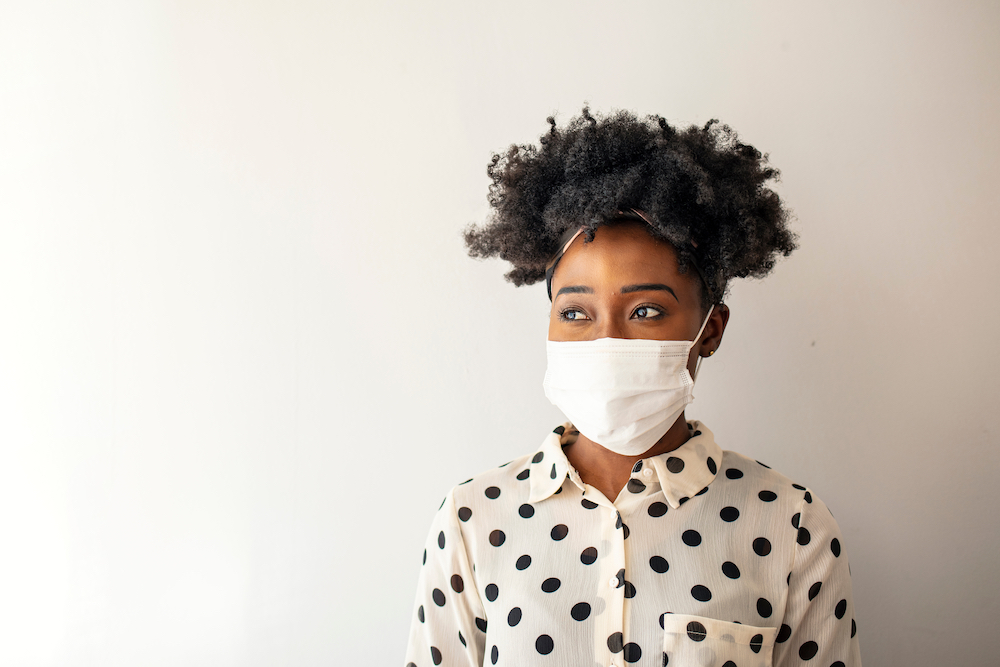Answering Your Top COVID-19 Skin Questions

As the nation enters another month of dealing with the effects of COVID-19, our office fields many questions from patients who have concerns about coronavirus-related skin issues. Two of the most common questions we hear include:
- How do I treat acne from wearing a mask?
- How safe is it to use this much hand sanitizer?
These are valid questions since we are all concerned about our health and safety, perhaps even more now than ever before. In this article, we will address these questions with the hope of giving you information and peace of mind.
If you live in the Atlanta area and have a concern about your skin, schedule an appointment with Dr. Straughn at Buckhead Dermatology. Our board certified dermatologist is offering virtual appointments to address a wide variety of skin concerns.
How do I treat acne from wearing a mask?
If you think your mask is causing acne on your face, you might be right. Since the onset of the coronavirus, “maskne” has become a hot topic. People who rarely experienced breakouts before are now wondering how to treat the red bumps that have appeared on their cheeks, chins and around their mouths. While over-the-counter topical treatments may be sufficient to handle the problem, more serious cases may require a visit with a dermatologist.
Masks trap heat, dirt and moisture on your skin and prevent air flow. These factors create the ideal conditions for bacteria to flourish. Bacteria that grows in your pores can clog your pores and cause acne such as blackheads, whiteheads and pustules. And because masks must be worn snuggly on the face, they can cause irritation which can further aggravate your skin.
While it is important to continue to wear masks as required, there are some steps you can take to reduce your chances of developing mask acne.
- Avoid wearing your mask for long periods of time if possible
- Choose a mask that fits comfortably and is made of a breathable material such as cotton
- Wash your mask frequently using a gentle detergent
- Transition your skincare routine to gentle products
- Do not rub, scrub or over-exfoliate your skin
The CDC continues to recommend the use of masks and it is mandated in many states across the country. By following the tips above, you should see an improvement in your skin. If your acne continues to worsen, schedule an appointment with a dermatologist near you for a more advanced diagnosis and specialized treatment.
How safe is it to use this much hand sanitizer?
Hand sanitizer has reached record levels of popularity during the last ten months. Every household, business and organization scrambled to stock up on the stuff at the start of the pandemic, and continue to do so as numbers of cases continue to increase. While the benefits of clean hands are quite obvious, it does beg the question: Is it safe to use hand sanitizer so frequently?
Clean hands can help prevent the spread of colds, the flu and other viruses. Washing your hands with soap and warm water is the most effective way to sanitize. However, this is not always an option. Hand sanitizer products can also be effective in reducing bacteria and viruses, but beware.
When choosing a hand sanitizer, be sure to check the ingredients. Not all products are made with safe, natural and legal ingredients. In fact, some popular products that are on the market have contained toxic methanol and 1-propanol. Both of these ingredients can be harmful to humans when ingested, causing serious side effects and even death.
Other ingredients in hand sanitizers such as alcohol, fragrances, preservatives and oils can irritate the skin and result in contact dermatitis. Studies have also shown that repeated use can increase resistance to antibiotics and weaken the immune system.
There are several considerations to keep in mind when using hand sanitizer products. Check the label to ensure that the product does not contain any harmful or toxic ingredients. Always default first to washing your hands with soap and water. If this is impossible, use hand sanitizer. Hand washing is gentler on your skin and more effective. Monitor your skin for allergic reactions or the development of a rash or redness after use. If you notice a negative reaction, discontinue use of the product and contact your doctor.
